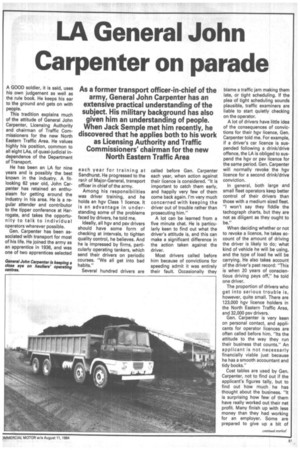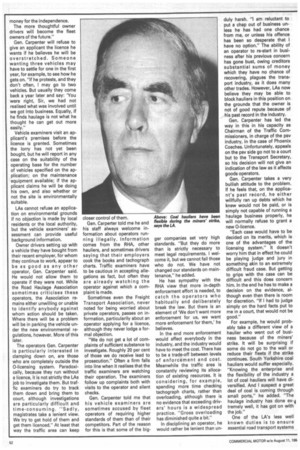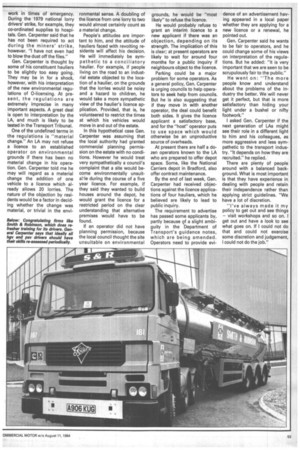LA General John Carpenter on parade
Page 53

Page 54

Page 55

If you've noticed an error in this article please click here to report it so we can fix it.
As a former transport officer-in-chief of the army, General John Carpenter has an extensive practical understanding of the subject. His military background has also given him an understanding of people. When Jack Semple met him recently, he discovered that he applies both to his work as Licensing Authority and Traffic Commissioners' chairman for the new North Eastern Traffic Area
A GOOD soldier, it is said, uses his own judgement as well as the rule book. He keeps his ear to the ground and gets on with people.
This tradition explains much of the attitude of General John Carpenter, Licensing Authority and chairman of Traffic Commissioners for the new North Eastern Traffic Area. He values highly his position, common to all eight LAs, of quasi-judicial independence of the Department of Transport.
He has been an LA for nine years and is possibly the best known in the industry. A fitlooking 62 year old, John Carpenter has retained an enthusiasm for getting around the industry in his area. He is a regular attender and contributor to the tipper conference at Harrogate, and takes the opportunity to talk to individual operators wherever possible.
Gen. Carpenter has been associated with transport for most of his life. He joined the army as an apprentice in 1936, and was one of two apprentices selected each year for training at Sandhurst. He progressed to the rank of Major-General, transport officer in chief of the army.
Among his responsibilities was driver training, and he holds an hgv Class 1 licence. It is an advantage in understanding some of the problems faced by drivers, he told me.
Ideally, all hgv and psv drivers should have some form of checking at intervals, to tighten quality control, he believes. And he is impressed by firms, particularly operating tankers, which send their drivers on periodic courses. "We all get into bad habits."
Several hundred drivers are called before Gen. Carpenter each year, when action against their licence is considered. "It is important to catch them early, and happily very few of them come back again. I'm very much concerned with keeping the driver out of trouble rather than prosecuting him."
A lot can be learned from a five minute chat. He is particularly keen to find out what the driver's attitude is, and this can make a significant difference in the action taken against the driver.
Most drivers called before him because of convictions for speeding admit it was entirely their fault. Occasionally they blame a traffic jam making them late, or tight scheduling. If the plea of tight scheduling sounds plausible, traffic examiners are liable to start quietly checking on the operator.
A lot of drivers have little idea of the consequences of convictions for their hgv licence, Gen. Carpenter told me. For example, if a driver's car licence is suspended following a drink/drive offence, the LA is obliged to suspend the hgv or psv licence for the same period. Gen. Carpenter will normally revoke the hgv licence for a second drink/drive conviction.
In general, both large and small fleet operators keep better control of their drivers than those with a medium sized fleet. "I won't say they fiddle the tachograph charts, but they are not as diligent as they ought to be."
When deciding whether or not to revoke a licence, he takes account of the amount of driving the driver is likely to do; what kind of vehicle he will be using, and the type of load he will be carrying. He also takes account of the driver's past record: "This is when 20 years of conscientious driving pays off," he told one driver.
The proportion of drivers who get into serious trouble is, however, quite small. There are 123,000 hgv licence holders in the North Eastern Traffic Area, and 32,000 psv drivers.
Gen. Carpenter is very keen on personal contact, and applicants for operator licences are often called before him. "Its the attitude to the way they run their business that counts." An applicant is not necessarly financially viable just because he has a smooth accountant and tidy books."
Cost tables are used by Gen. Carpenter, not to find out if the applicant's figures tally, but to find out how much he has thought about the business. "It is surprising how few of them have really worked out their net profit. Many finish up with less money than they had working for an employer. Some are prepared to give up a bit of money for the independence.
The more thoughtful owner drivers will become the fleet owners of the future."
Gen. Carpenter will refuse to give an applicant the licence he wants if he believes he will be overstretched. Someone wanting three vehicles may have to settle for one in the first year, for example, to see how he gets on. "If he protests, and they don't often, I may go to two vehicles. But usually they come back a year later and say: 'You were right, Sir, we had not realised what was involved until we got into business. Equally, if he finds haulage is not what he thought he can get out more easily."
Vehicle examiners visit an applicant's premises before the licence is granted. Sometimes the lorry has not yet been bought, but he will report in any case on the suitability of the operating base for the number of vehicles specified on the application; on the maintenance equipment available; if the applicant claims he will be doing his own, and also whether or not the site is environmentally suitable.
LAs cannot refuse an application on environmental grounds if no objection is made by local residents or the local authority, but the vehicle examiners' assessment can provide useful background information.
Owner drivers setting up with a vehicle they have bought from their recent employer, for whom they continue to work, appear to be as good as any other operator, Gen. Carpenter said. He would not allow them to operate if they were not. While the Road Haulage Association sometimes criticises these operators, the Association remains either unwilling or unable to identify anybody against whom action should be taken. Where there will be a problem will be in parking the vehicle under the new environmental regulations, however. More of this later.
The operators Gen. Carpenter is particularly interested in clamping down on, are those who are completely outside the 0-licensing system. Paradoxically, because they run without a licence, it is not strictly the LAs job to investigate them. But traffic examiners do try to track them down and bring them to court, although investigations are particularly difficult and time-consuming. "Sadly, magistrates take a lenient view. We try to get hold of them and get them licenced." At least that way the traffic area can keep closer control of them.
Gen. Carperter told me he and his staff always welcome information about operators running illegally. Information comes from the RHA, other hauliers, and sometimes drivers saying that their employers cook the books and tachograph charts. Traffic examiners have to be cautious in accepting allegations as fact, but often they are already watching the operator against which a cornplaint is made.
Sometimes even the Freight Transport Association, never noted for being worried about private operators, passes on information, particularily about an operator applying for a licence, although they never lodge a formal objection.
"We do not get a lot of complaints of sufficient substance to investigate. Roughly 20 per cent of those we do receive lead to prosecution." Often a firm falls into line when it realises that the traffic examiners are watching their operation. The examiners follow up complaints both with visits to the operator and silent checks.
Gen. Carpenter told me that his vehicle examiners are sometimes accused by fleet operators of requiring higher standards of them than of their competitors. Part of the reason for this is that some of the big ger companies set very high standards. "But they do more than is strictly necessary to meet legal requirements. I welcome it, but we cannot fail those who do not. We have not changed our standards on maintenance," he added.
He has sympathy with the RHA view that more in-depth enforcement effort is needed, to catch the operators who habitually and deliberately break the law. But there is an element of 'We don't want more enforcement for us, we want more enforcement for them,' he believes.
In the end more enforcement would affect everybody in the industry, and the industry would have to meet the cost. There has to be a trade-off between levels of enforcement and cost. Meanwhile the traffic area is constantly reviewing its allocation of existing resources. It is considering, for example, spending more time checking tachograph charts, rather than overloading, although there is no evidence that exceeding drivers' hours is a widespread practice. "Gross overloading has diminished quite a bit."
In disciplining an operator, he would rather be lenient than un duly harsh. "I am reluctant to put a chap out of business unless he has had one chance from me, or unless his offence has been so desperate that I have no option." The ability of an operator to re-start in busi ness after his previous concern has gone bust, owing creditors substantial sums of money which they have no chance of recovering, plagues the trans port industry, as it does many other trades. However, LAs now believe they may be able to block hauliers in this position on the grounds that the owner is not of good repute because of his past record in the industry.
Gen. Carpenter has led the way in this in his capacity as Chairman of the Traffic Com missioners, in charge of the ow,/ industry, in the case of Phoenix Coaches. Unfortunately, appeals on the psv side go not to a court but to the Transport Secretary, so his decision will not give an indication of the law as it affects goods operators.
Gen. Carpenter takes a very bullish attitude to the problem.
If he feels that, on the applica nt's past record, he either willfully ran up debts which he knew would not be paid, or is simply not capable of running a haulage business properly, he will normally refuse to grant a new 0-licence.
"Each case would have to be decided on its merits, which is one of the advantages of the licensing system." It doesn't worry him that in effect he could be playing judge and jury in something akin to an extremely difficult fraud case. But getting to grips with the case can be difficult and this does concern him. In the end he has to make a decision on the evidence, al though even then there is room for discretion. "If I had to judge simply on the hard facts put to me in a court, that would not be good."
For example, he would probably take a different view of a haulier who went out of busi ness because of the miners' strike. It will be surprising if some do not go to the wall or reduce their fleets if the strike continues. South Yorkshire coal hauliers would suffer especially.
"Knowing the enterprise and the flexibility of the industry a lot of coal hauliers will have diversified. And I suspect a great deal of coal is coming through small ports," he added. "The haulage industry has done ex-4 tremely well, it has got on with the job."
One of the LA's less well known duties is to ensure essential road transport systems work in times of emergency. During the 1979 national lorry drivers' strike, for example, they co-ordinated supplies to hospitals. Gen. Carpenter said that he has not been required to act during the miners' strike, however. "I have not even had to blow the dust off the files."
Gen. Carpenter is thought by some of his constituent hauliers to be slightly too easy going. They may be in for a shock, however, with his interpretation of the new environmental regulations of 0-licensing. At present, the regulations are extremely imprecise in many important aspects. A great deal is open to interpretation by the LA, and much is likely to be tested in the Transport Tribunal.
One of the undefined terms in the regulations is "material change." An LA may not refuse a licence to an established operator on environmental grounds if there has been no material change in his operation. Gen. Carpenter told me he may will regard as a material change the addition of one vehicle to a licence which already allows 20 lorries. The nature of the objection by residents would be a factor in deciding whether the change was material, or trivial in the envi ronmental sense. A doubling of the licence from one lorry to two would almost certainly count as a material change.
People's attitudes are important to him, and the attitude of hauliers faced with revolting residents will affect his decision. He will immediately be sympathetic to a conciliatory haulier. For example, if people living on the road to an industrial estate objected to the location of a haulier, on the grounds that the lorries would be noisy and a hazard to children, he would take a more sympathetic view of the haulier's licence application. Provided, that is, he volunteered to restrict the times at which his vehicles would move in and out of the estate.
In this hypothetical case Gen. Carpenter was assuming that the local authority had granted commercial planning permission on the estate with no conditions. However he would treat very sympathetically a council's complaint that a site would become environmentally unsuitaHe during the course of a five year licence. For example, if they said they wanted to build houses around the depot, he would grant the licence for a restricted period on the clear understanding that alternative premises would have to be found.
If an operator did not have planning permission, because the local council thought the site unsuitable on environmental grounds, he would be "most likely" to refuse the licence.
He would probably refuse to grant an interim licence to a new applicant if there was an objection, depending on its strength. The implication of this is clear; at present operators are likely to wait for around four months for a public inquiry if neighbours object to the licence.
Parking could be a major problem for some operators. As a general policy, Gen. Carpenter is urging councils to help operators to seek help from councils. But he is also suggesting that if they move in with another operator, the deal could benefit both sides. It gives the licence applicant a satisfactory base, and for the "host" operator puts to use space which would otherwise be an unproductive source of overheads.
At present there are half a dozen operators known to the LA who are prepared to offer depot space. Some, like the National Carriers depot in Bradford, also offer contract maintenance.
By the end of last week, Gen. Carpenter had received objections against the licence applications of four hauliers, which he believed are likely to lead to public inquiry.
The requirement to advertise has passed some applicants by, partly because of a slight ambiguity in the Department of Transport's guidance notes, which are being amended. Operators need to provide evi dence of an advertisement having appeared in a local paper whether they are applying for a new licence or a renewal, he pointed out.
Gen. Carpenter said he wants to be fair to operators, and he could change some of his views on interpretation of the regulations. But he added: "It is very important that we are seen to be scrupulously fair to the public."
He went on: "The more people know and understand about the problems of the industry the better. We will never get it perfect, but that is more satisfactory than hiding your light under a bushel or nifty footwork."
I asked Gen. Carpenter if the next generation of LAs might see their role in a different light to him and his colleagues, as more aggressive and less sympathetic to the transport industry. "It depends on how they are recruited." he replied.
There are plenty of people around with a balanced background. What is most important is that they have experience in dealing with people and retain their independence rather than applying strict guidelines. "We have a lot of discretion.
"I've always made it my policy to get out and see things — visit workshops and so on. I get out and have a look to see what goes on. If I could not do that and could not exercise some discretion and judgement, I could not do the job."




















































































